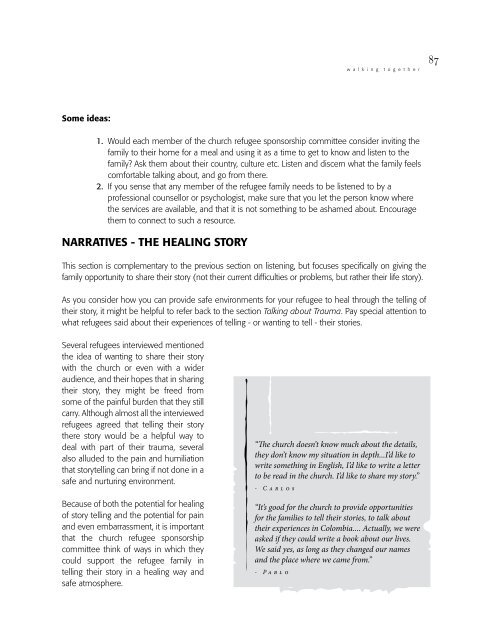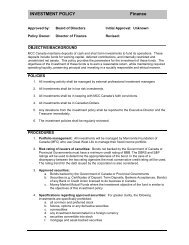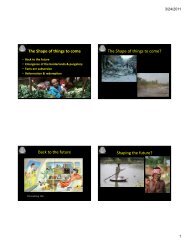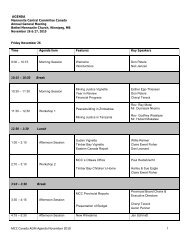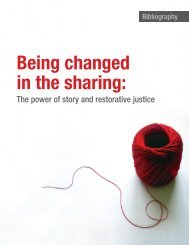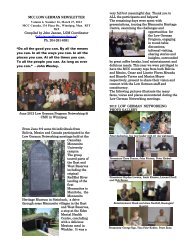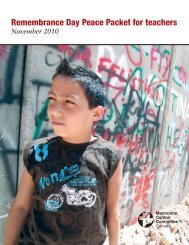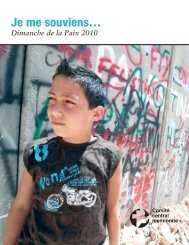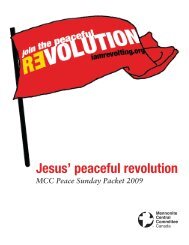Walking together: Healing and hope for Colombian refugees
Walking together: Healing and hope for Colombian refugees
Walking together: Healing and hope for Colombian refugees
You also want an ePaper? Increase the reach of your titles
YUMPU automatically turns print PDFs into web optimized ePapers that Google loves.
w a l k i n g<br />
t o g e t h e r<br />
87<br />
Some ideas:<br />
1. Would each member of the church refugee sponsorship committee consider inviting the<br />
family to their home <strong>for</strong> a meal <strong>and</strong> using it as a time to get to know <strong>and</strong> listen to the<br />
family? Ask them about their country, culture etc. Listen <strong>and</strong> discern what the family feels<br />
com<strong>for</strong>table talking about, <strong>and</strong> go from there.<br />
2. If you sense that any member of the refugee family needs to be listened to by a<br />
professional counsellor or psychologist, make sure that you let the person know where<br />
the services are available, <strong>and</strong> that it is not something to be ashamed about. Encourage<br />
them to connect to such a resource.<br />
NARRATIVES - THE HEALING STORY<br />
This section is complementary to the previous section on listening, but focuses specifically on giving the<br />
family opportunity to share their story (not their current difficulties or problems, but rather their life story).<br />
As you consider how you can provide safe environments <strong>for</strong> your refugee to heal through the telling of<br />
their story, it might be helpful to refer back to the section Talking about Trauma. Pay special attention to<br />
what <strong>refugees</strong> said about their experiences of telling - or wanting to tell - their stories.<br />
Several <strong>refugees</strong> interviewed mentioned<br />
the idea of wanting to share their story<br />
with the church or even with a wider<br />
audience, <strong>and</strong> their <strong>hope</strong>s that in sharing<br />
their story, they might be freed from<br />
some of the painful burden that they still<br />
carry. Although almost all the interviewed<br />
<strong>refugees</strong> agreed that telling their story<br />
there story would be a helpful way to<br />
deal with part of their trauma, several<br />
also alluded to the pain <strong>and</strong> humiliation<br />
that storytelling can bring if not done in a<br />
safe <strong>and</strong> nurturing environment.<br />
Because of both the potential <strong>for</strong> healing<br />
of story telling <strong>and</strong> the potential <strong>for</strong> pain<br />
<strong>and</strong> even embarrassment, it is important<br />
that the church refugee sponsorship<br />
committee think of ways in which they<br />
could support the refugee family in<br />
telling their story in a healing way <strong>and</strong><br />
safe atmosphere.<br />
“The church doesn’t know much about the details,<br />
they don’t know my situation in depth...I’d like to<br />
write something in English, I’d like to write a letter<br />
to be read in the church. I’d like to share my story.”<br />
- Carlos<br />
“It’s good <strong>for</strong> the church to provide opportunities<br />
<strong>for</strong> the families to tell their stories, to talk about<br />
their experiences in Colombia.... Actually, we were<br />
asked if they could write a book about our lives.<br />
We said yes, as long as they changed our names<br />
<strong>and</strong> the place where we came from.”<br />
- Pablo


